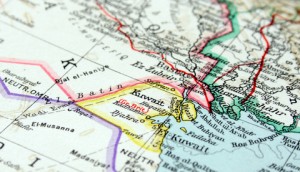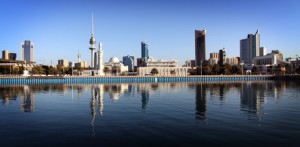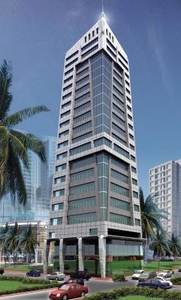
[Updated Oct 2020] For further offices information or to search office space for rent in Kuwait City just click. Or contact us for any other office space query.
A guide to serviced offices and office space for rent in Kuwait City as well as general information that may be useful if you are thinking of renting office space in Kuwait City.
A Fortress Near the Water
Kuwait City is the capital of the independent Arab nation that carries its name – a name thought to stem from the Arabic word ‘akwat’, meaning ‘a fortress near the water‘. It would seem to be aptly named as the city has been a largely effective stronghold for its inhabitants and for its ruling family for the past few centuries.
There are now roughly 2.4 million people living in and around Kuwait City, with only a few hundred thousand living elsewhere in the emirate. The founders of the city are believed to have been members of the Bani Utbah tribe and the Al-Sabah clan, which travelled across from central Arabia at the beginning of the 18th century. Members of this same lineage make-up the ruling dynasty of Kuwait to this day.
Soon after the coastal areas of modern Kuwait City were settled, it had become a sizeable port and a noteworthy settlement within the Persian Gulf. Its progress and growth continued well into the 19th century, by which time the ‘great powers’ of the region were starting to take an interest in the city. Strategic decisions and allegiances involving the Ottoman and British empires were the subject of much conjecture, disagreement and eventually bloodshed within the Al-Sabah family.
Western Interest
British forces were active across much of the world at this time and particularly in the areas surrounding the Persian Gulf and en route to its colonies further east. Keen to maintain some level of sovereignty, Kuwait City’s rulers agreed to various treaties with the British and with the Ottomans, though the latter’s influence was to wane after the outbreak of the First World War. Thereafter, Kuwait became an independent nation but it remained under the protectorate of the British.
British interest in the state, whose borders with Saudi Arabia and Iraq were now officially defined, grew ever stronger after oil was discovered in the area during the mid-1930s. The scale of economic activity in Kuwait and its capital city increased dramatically in the decades after oil was first found below the sand and it has since gone on to become one of the richest countries in the world in terms of per capita income levels.
It took until 1961 for Kuwait to become fully independent and free of British rule or direct influence but ties to Western powers have remained. The city and its ruling family, in particular, have been courted by American businesses for decades and Kuwaitis are now some of the largest stockholders in a range of US companies. Ties in this context were strengthened considerably after American troops helped Kuwait rid itself of occupying Iraqi forces in the early 1990s.

Economy
The invasion and brief annexation of Kuwait by Saddam Hussein and his Iraqi army caused a great deal of damage to the infrastructure of the capital city and left many of its oil fields ablaze, wasting millions of barrels of oil a day at one point. Nevertheless, the episode had the effect of redoubling efforts on Kuwaiti development and economic growth.
Kuwait is a tax-free state and so the huge majority of its capital revenues come from exports and principally the sale of oil to other countries around the world. As a result, the strength of its economy fluctuates to a large extent along with the price of oil on international markets. By most measures, however, Kuwait has one of the strongest economies and development levels in the Middle East.
Aside from oil production, the Kuwait City economy focuses on sectors including shipping, construction, cement production and financial services. Banks based in the city’s main financial district are among the most prominent in the Arab world and serious efforts and investments are being made with the aim of making Kuwait a tourist attraction to compete with any other location in the Gulf.
Office space to rent in Kuwait City
As in most other countries around the world, the global economic crises of 2008 did some considerable damage to the market for office space to rent in Kuwait City. Demand for offices in the city was strong enough to outstrip supply in the period prior to the credit crunch but in recent years the opposite has generally been true. Bad news for owners and developers of office blocks in the capital but for prospective tenants there are plenty of good deals currently on offer.
A report in 2010 from real estate analysts at DTZ suggested that landlords are offering incentives of various sorts in an effort to attract businesses to the office space they have available in Kuwait City. In general terms, the signs are good for the national economy with stable growth rates having been achieved in recent years and there are strong levels of new office developments coming on stream in 2011 and 2012.
There are dozens of high-profile multi-national corporations whose business interests are represented in Kuwait City and who have office space in central areas, including the likes of Microsoft, IBM, KPMG and British Airways, as well as oil giants like Shell, Exxon and BP.

Tourism and business travel accommodation
Strong economic activity over a sustained period has helped foster a much greater interest in Kuwait City and its surrounding areas along the Persian Gulf among foreign visitors and tourist-sector investors. Recent years have seen some truly spectacular hotel developments commissioned and completed in and around the city, with visitors from throughout the region and the world now heading there on holiday.
There are thousands of hotel rooms available across the city on a nightly basis and this figure is set to increase much further over the course of the next few years. A huge range of accommodation is now well established to meet the needs of business travellers arriving in Kuwait City and it is often counted among the most luxurious destinations in the world.
Transport
Road links across Kuwait as a whole are as well laid and maintained as anywhere else in the world but they need to be because cars are by far the most commonly used form of transport throughout the country. There are currently no railways linking the country or running across the city, although a light train or metro system has been proposed for development and could soon be established. The Kuwait International Airport is roughly ten miles from the city centre and it welcomes millions of international travellers annually and accommodates dozens of regional and international airlines.
Kuwaiti Culture
The culture of Kuwait City is based partly on the religious adherence of almost all of its inhabitants and partly on its geographical location. Islamic teachings and practices are an important aspect of daily life in Kuwait and traditional clothing is widely worn, though not as common among younger generations. Being by the sea has given the people of Kuwait a love of seafood and the local diet has also been strongly influenced by its position along the route of the centuries-old east-to-west spice trade.
We carry out a free office space search and our advisory and acquisition services are also free, always. Our Kuwait City office space brokers and agents are globally regulated by the Royal Institution of Chartered Surveyors (RICS) ensuring the highest standards of commercial property advice and service at all times. We look forward to helping you find the best office space for rent for your business.

The Office Providers are Regulated by the Royal Institution of Chartered Surveyors (RICS)